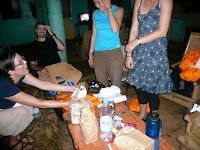It's been a busy month over here in Senegal. PCVs Marielle, Annē and I spent the last few weeks prepping
for and then facilitating a visit from a team of Americans from the NGO peacecare. (Honestly, Marielle did the
lion’s share of the leg- and paperwork, but we all pitched in to run
preparatory trainings and take care of loose ends.) The team came to work on an
ongoing cervical cancer screening and treatment project, and having them here
was a great experience, we had a good time and I learned quite a bit. I would
write more about peacecare and the work
we’ve been doing with them, but I’ve already done so,
here and
here and
here.
Cervical cancer screening and prevention is an interesting and worthy project, one that’s very valuable both
for the local Senegalese communities and for the visiting American medical
students and residents who are able to spend a little time working with
Senegalese health professionals and seeing how the provision of health care is
carried out in another part of the world. It was really nice to see Andrew again, and great to meet Gabi, Katie, Angel and Charles. Another peacecare team is scheduled to come to Kédougou in February of 2013, to lead cryotherapy (freezing of pre-cancerous lesions) treatment trainings for local health professionals, and we’re already looking forward it.
And now, in somewhat scrambled order (it's hard to drag lots of photos around in Blogger sometimes), are photos of some of the highlights of the October 2012 peacecare trip.
Marielle and I walking; kids playing with red rubber balls during a screening day in a gold mining village; Charles (one of the visiting residents taking an out-the-window snapshot of the Kédougou mosque.
The whole team posing after a meeting with the top Kédougou Medical Officials; someone giving me Skittles; Patrick Linn greeting the Saraya village chief as he gave out Senegalese names to the newcomers.
Me translating for Charles while Madame Diop looked on; Mariama (who's favorite joke is that she's Canadian)and I talking shop; Marielle leading a stroll out to the fields around Saraya.
Annē and Patrick's host siblings; their brother making tea on their host family's compound; the kids leading us out to visit the peanut fields.
Crossing a stream on our way to the fields; Angel (one of the visiting residents) came thisclose to sticking the landing.
Walking among the peanuts; loading into one of the hospital trucks to go out for a screening day.
Sitting through a meeting; eating
ceeb u jen (fish and rice) and
maafe tiga (peanut sauce) for lunch; some boutiques in the Kédougou market.
A "Tata" car in Kédougou; Fatou and I having similar thoughts during a meeting.
The Americans giving us wonderful, thoughtful, delicious treats; Andrew reliving the delight of being given fancy American snacks in Africa.
Fatou (the main screening trainer) and I jumping rope. It was a short little kids rope. She was better.
Charles and his fan club; the most amazing little kid just chowing down on some rice.
Rocks waiting to be crushed into dust (and boiled with mercury to separate out the gold); fancy fancy
ceeb u yap (rice with meat).
On the path from the peanut fields; Sajou, in her fields with the Saraya Health PCVs.
Annē and the speculums on a screening day; Charles smashing an unripe baobab pod to see what was inside. (It was unripe baobab stuff.)
Annē/Sajou, LaRocha/Adama, Charles/Ibrahima, and Angel/Mariama - screening team extraordinaire!






























.jpg)

















